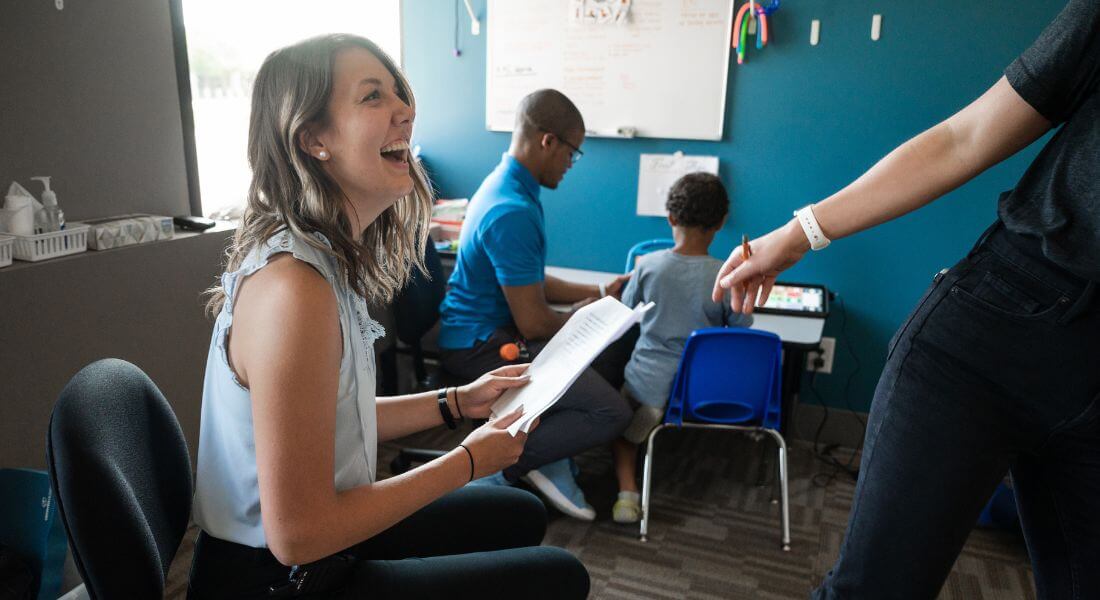Hopebridge Emphasizes Wellness and Resilience for Clinicians
February 01, 2023
February 01, 2023

We all know the airline quote, “Put your own oxygen mask on first before assisting others,” but that advice can be difficult to remember when working in healthcare.
In addition to the natural stresses that come with caring professions, applied behavior analysis (ABA) is a young industry with many demands, which can put more pressure on clinicians, in addition to what they put on themselves to make sure they are giving their best work.
“We have to remember that we are people, too. It’s so easy to focus on the kids and their families, but coming back to oneself is incredibly important,” said Hopebridge Director of Employee Experience Ali Thomas.

Everything we do is for the health and safety of our patients, but the wellness and resilience of Hopebridge team members is also a priority because compassion fatigue is real. From ICU nurses to teachers to autism service providers, caring for others is not always easy, but it can be extremely fulfilling when that compassion fatigue is addressed.
“At Hopebridge, we’re actively thinking about what tools we can proactively offer to our team to support their self-care. Our goal is to provide a healthy environment and get resources into the hands of our BCBAs, RBTs and therapists earlier to prevent burnout and build resilience,” added Ali. “We want to make this a sustainable career path for our people. This is not just a stop on the journey; it is the journey.”
While our Hopebridge Heroes have always been top of mind, one of the ways we continue to keep their wellness on the forefront is by re-investing in them.
Hopebridge Chief Human Resources Officer Kimberly Topps joined the senior leadership team to do exactly this. She focuses on building relationships, internal communication, team collaboration, change management, compliance and other initiatives to ensure Hopebridge remains a great place to work.

Kimberly is not alone in these efforts. Ali’s role is based around enhancing the employee experience and engagement. In addition to the coordination of leadership development and training in this area, the two of them often team up with center managers, clinical directors and more to build resources and programming off their insights.
The CDC offers a great framework around mental health in the workplace that informs much of Hopebridge’s programming, though listening to our people is also key. Here are some of the small – but impactful – efforts Hopebridge team members mentioned they have enjoyed in and around the centers:
“We work with kids, so we get to have fun!” reminds Ali.
Sometimes it’s about scheduling time for a break, too. For example, today’s workforce often feels guilt around using paid time off (PTO)—sometimes even when they are sick. At Hopebridge, we want our leadership and their team members to work together to plan that time off to help them keep a healthy balance alongside their hard work and dedication on the job.
“I’m a huge advocate for self-care. I try to model and preach the same mindset to my RBTs,” said Hopebridge Board Certified Behavior Analyst (BCBA) Mandy Fernandez. “We can’t help these children regulate their feelings if we can’t do it ourselves. That may mean taking a minute to collect yourself. Burnout is real, so recognize whenever you need to take a break.”
Job satisfaction is affected by more than a role’s responsibilities, compensation and company parties every now and then. It is achieved when there is a culture full of fun, appreciation, growth and development, reflection and a healthy work-life balance.
We aim to offer our team members even more resources, training and support around everything from education around the benefits offered at Hopebridge, to information around community activities for the case manager who transitions to a new center.

As part of these initiatives, Hopebridge introduced a “Feel-Good February” campaign, in which the company celebrated Wellness Wednesdays with themes and activities focused around – you guessed it – wellness.
It covered gratitude, with a gratitude tree activity and wellness group discussions, plus highlighted the work-life balance, self-care and movement, and reflection and resilience. Activities included breathwork and yoga practices, journaling, curated music playlists and more.
“It’s not a one-size-fits-all approach, but rather intends to give folks more tools they can use to support their needs or their team’s,” said Ali. “We not only want to make working at Hopebridge more fun and fulfilling, we want to serve as a pioneer in making work within the autism service industry a more positive experience overall.”
It’s important to us at Hopebridge that this feels like more than “just a job” to our people. We want it to be a calling. A career. An education. An impact on the community. A joy. We want it to be your dream job.
If this sounds like a fit for you, we hope you will apply to join our team so you can be part of the mission to provide access to quality, compassionate care to underserved communities while also growing your own skills and career.
*Informed consent was obtained from the participants in this article. This information should not be captured and reused without express permission from Hopebridge, LLC.
Parenting Resources
September 13, 2021
5 Tips for Helping a Child with Autism Enjoy Football Season